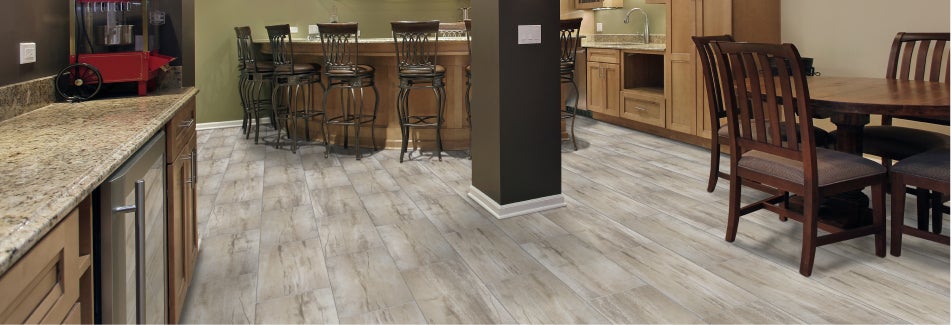
When it comes to shopping for new flooring, the basement poses a unique challenge in that it is the one room in a home that will often be used in a variety of finished states. Some basements have been built out with all the creature comforts of a typical family room, while others have only the bare necessities required to make them usable. And many exist in the in-between state, somewhat finished but lacking the refinement found in the rest of the home. Whatever the current state of your basement—or your hopes for a future renovation—we’re here to help with basement flooring ideas.
Vinyl
For many, vinyl has always been the stereotypical basement floor. It’s what was in the house we grew up in, the basement flooring at Grandma and Grandpa’s house, and in the basement of just about every community center. And that was for good reason: vinyl has long offered a convenient combination of durability, design versatility, affordability, and ease of maintenance. These are all great qualities for floors in a sub-grade space where a wide range of activities occur. But if you have memories of unsightly vintage patterns and bubbling linoleum coming up from the floor in spots, we’ve got some good news. Today’s vinyl flooring options—whether sheet, tile, or plank—are high-quality products that are built to impress when it comes to style and longevity.
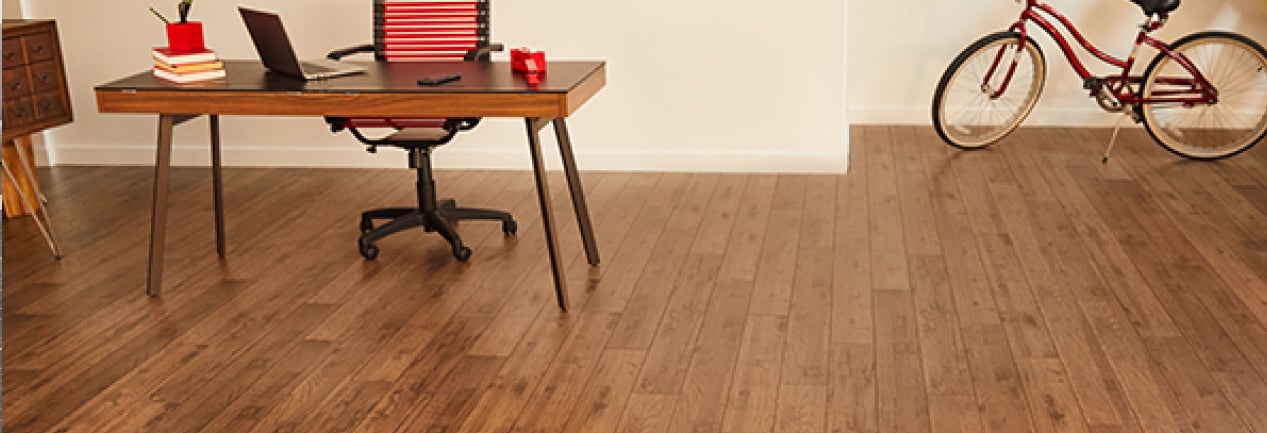
Tile
Tile is a common basement flooring material because it possesses two of the most important traits needed in a multi-use subterranean space: water resistance and high overall durability. Since many basements experience above-average moisture levels—whether from seepage of liquid water or simple lingering dampness—choosing a water-resistant or waterproof basement floor is always a smart idea. Tile floors are also durable enough to stand up to high traffic and are easy to maintain. Tile’s main downside? In chilly climates, your basement flooring might stay uncomfortably cold.
Carpet
Carpet is often frowned upon as a basement flooring option, but it doesn’t have to be. Whether or not you can have carpet installed in your particular basement will depend almost entirely on one factor: if your basement takes on water with any regularity. If your basement floods or even gets minor seepage any time it rains, even just during the occasional mega-storm, then carpet is a bad idea.
But the typical damp basement atmosphere doesn’t automatically exclude the possibility of using carpet. As long as you don’t get liquid water intrusion, there are a variety of carpets that are suitable for use in the basement. Look for a low-pile carpet like Berber and features like mold and mildew resistance, non-odor trapping fibers, and high wear resistance. And carpet actually has one big advantage when it comes to the basement: because it easily conforms to the subfloor it is installed over, you don’t have to worry if your basement floor has the typically uneven surface.
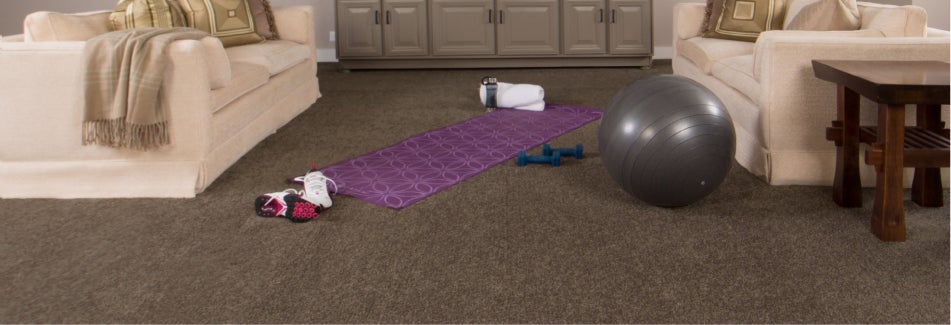
Laminate
You won’t find real hardwood on our list of basement floor ideas because of the high likelihood that it will get damaged by seepage. Even if your basement never floods or sees any level of water intrusion, the elevated humidity levels typical of any sub-grade space are enough to warp or buckle hardwood over time. But if you’re dead set on having the look and feel of hardwood in your finished basement, there’s still an excellent option: wood laminate flooring. Thanks to its composite construction—which makes for a durable, water-resistant product—you can safely have wood laminate installed in a basement (as long as there is no flooding).

What to consider when choosing basement flooring
Giving advice on the best basement flooring products can be difficult because the range of goals for the typical basement is so much wider than any other room in the home. For instance, it’s safe to assume how the typical bathroom or kitchen will be used, which makes flooring recommendations more straightforward. But common basement goals can run the gamut from fully building out a comfortable and stylish space for family entertainment to creating a rough workshop that needs only the most basic features.
Additionally, many basements experience some level of water seepage, which is one of the most important factors to consider when selecting new basement floors. The level of moisture your basement experiences will greatly influence the flooring suggestions and overall budget. So, while it might be difficult to provide any universal answers to these questions, we’re here to help give you an idea of what to consider.
Matching your basement flooring to your lifestyle
Your basement might be a cozy space where the family can gather and get a little noisy without disturbing the rest of the house. Or it may act as a large utility space, housing your washer and dryer and even a workbench for crafting or performing the usual small home repairs. And if you’re like many homeowners, your basement will likely pull double duty, sometimes as a space to relax and sometimes as a space to get dirty work done. You’ll want your basement floors to match these needs in style, comfort, and durability.
Pure Utility: The unfinished basement
Some basements stay unfinished because they flood during heavy rains, others because they simply aren’t needed for much more than storing off-season holiday decorations. In either of these cases, the typical bare concrete basement floor does the job, and you might not feel the need to make any improvements. But if you did want a small upgrade, whether to boost comfort a bit or simply to make the space feel a little more civilized, sheet vinyl would be an excellent choice. Typically the most affordable type of flooring for a large space like a basement, sheet vinyl comes in a range of styles, resists wear and water, and is easy to care for. Plus, its flexible sheets can conform to uneven basement floors that would be too rough for a rigid material like tile.
The lightly-finished basement
The “sort of finished” basement is a common phenomenon in modern homes. These types of basements will often be outfitted for casual entertaining but still lack the refinements you’d expect elsewhere in a home. Maybe the pool table and loud home theater system are down there, but the ceiling and walls are unfinished. Or only half the space is built out because the other half gets water seepage during heavy storms and is only used for storage. The best flooring for basements like these will add some style and improve overall comfort—while staying on budget and not requiring any complicated maintenance. Consider vinyl tile or vinyl plank for your partially finished basement.
Flooring for a fully finished basement
For the sake of this article, we will assume that your fully finished basement—or the basement that you’d like to renovate to that state—does not experience any amount of flooding or seepage. If that’s the case, then there are very few restrictions on what type of flooring you can use. Many homeowners opt for carpet in the basement, since it adds a significant boost in comfort and can help make the entire space feel warmer. It’s a good idea to consider a stain-resistant carpet if your basement will see lots of entertaining.
The only flooring to avoid in a basement is solid hardwood. This is because even though your basement may never flood, sub-surface spaces almost always experience higher levels of humidity than on the main or upper floors of a home. Over time, this elevated moisture can cause the wood to warp or buckle, ruining your floors. The good news is that Empire offers a variety of engineered hardwood or wood laminate flooring that is approved for below-grade applications like a basement. Many can even be installed directly onto concrete, saving the time and money of needing a subfloor upgrade.
Basement Flooring Budget
Many variables go into selecting the best flooring for basements—perhaps more than anywhere else in the home. As a result, a basement flooring budget can be harder to speak about in general terms. A simple sheet vinyl floor will, of course, be more affordable than a wood laminate one.
Basement floors can also require additional work that will add to the cost. One common source of added expense is the need for a subfloor, which will depend on a variety of factors. Although many flooring products can be installed directly onto concrete, that often only works in ideal situations. Your basement floor will likely need a vapor barrier, and those will vary in cost and complication depending on the flooring you choose. An uneven concrete floor will need to be leveled if you want to have laminate or tile safely installed.
Even with a perfectly level concrete floor, you may want to have a subfloor or other type of underlayment installed to increase comfort. Berber carpet can be installed directly onto concrete, for instance. But it will feel much softer and warmer underfoot with high-quality padding underneath. The same can go for underlayment installed beneath vinyl floors.
This wide set of variables is one of the reasons why it’s so important to consult a flooring professional when having basement flooring installed. During your in-home estimate, your consultant can address these variables with you and be able to give you a better idea of potential costs while you’re in the decision-making process.
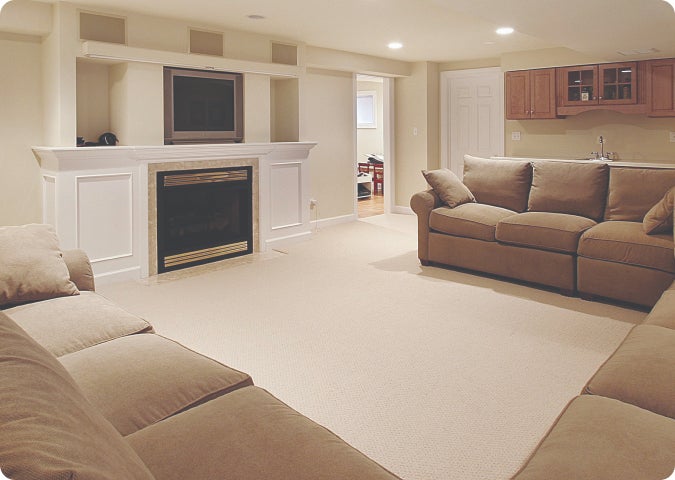
Basement Flooring Trends
While the basement is often a space filled with hand-me-down furniture and other mismatched goods, it doesn’t have to be devoid of style. Here are some of the most popular trends when it comes to basement flooring.
Cozy Retreat
The finished basement often becomes the family retreat area—the room where everyone can unwind to escape the stresses of life. A welcoming basement demands cozy surfaces, from cushy couches to comfortable carpet floors. Consider plush or frieze carpets, whose thick fibers make for a welcoming surface for walking or playing. An earth-toned carpet can also add some warmth to a room that is often cold—both literally and figuratively. Opting for a thicker carpet pad will further improve comfort and can help keep ground temperatures consistent.
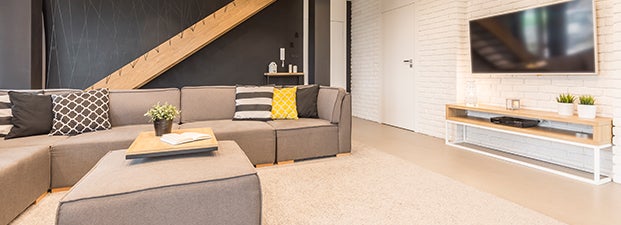
Contemporary Comfort
Consider this the more mature version of the cozy retreat. Creating a welcoming space is still a high priority, but this basement will have a little more thought put into aesthetics; the design process will be a bit more deliberate. A well-designed contemporary basement will be nice enough for entertaining guests, yet still be a place for playtime. The comfortable, contemporary basement will still benefit greatly from practicality, so floors that are durable and easy to maintain will excel here. Consider vinyl tile, luxury vinyl plank, or wood laminate flooring in neutral tones.
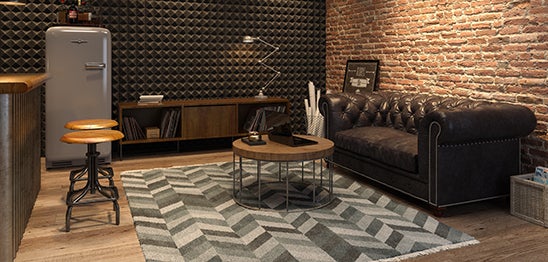
Basement Flooring FAQs
What is the best floor to put in a basement?
The best flooring for a basement is one that is durable, water-resistant, and easy to maintain. Vinyl plank, vinyl tile, and porcelain or ceramic tile floors possess all of these qualities.
Can I have hardwood floors installed in my basement?
Real wood flooring is the one material that should not be installed in basements. Even if your basement never floods, the typically high moisture levels can quickly take their toll, causing the wood to warp, buckle, or worse. But wood laminate, sheet vinyl, and vinyl plank flooring offer the look of wood without the worries.
What is the easiest basement flooring to maintain?
You can find a variety of flooring types that prioritize ease of maintenance, but if you want to choose the absolute easiest basement flooring to care for, we suggest sheet vinyl.
Can I have carpet installed in the basement?
Yes! If your basement has been waterproofed, any type of carpet is suitable. Consider a carpet with enhanced mold and mildew resistance. A thick carpet padding can help increase overall comfort.
Can I have flooring installed directly onto my concrete basement floor?
This is a very common question, but there’s no universal answer. It will depend on the quality and levelness of your current floor and the particular product you want to have installed. After inspecting your basement during the in-home consultation, your flooring professional will be able to give you an accurate answer.

